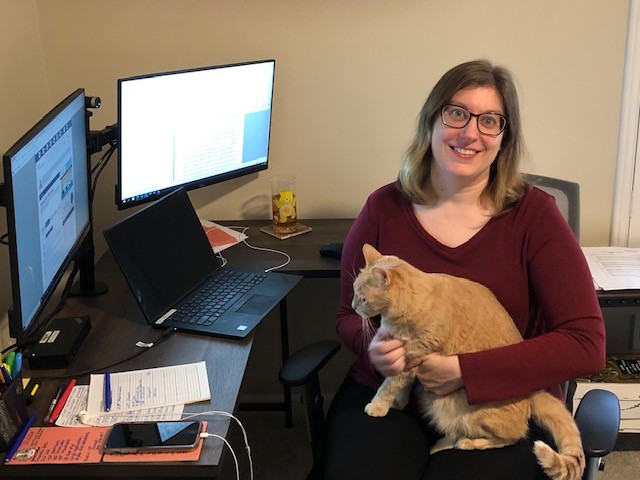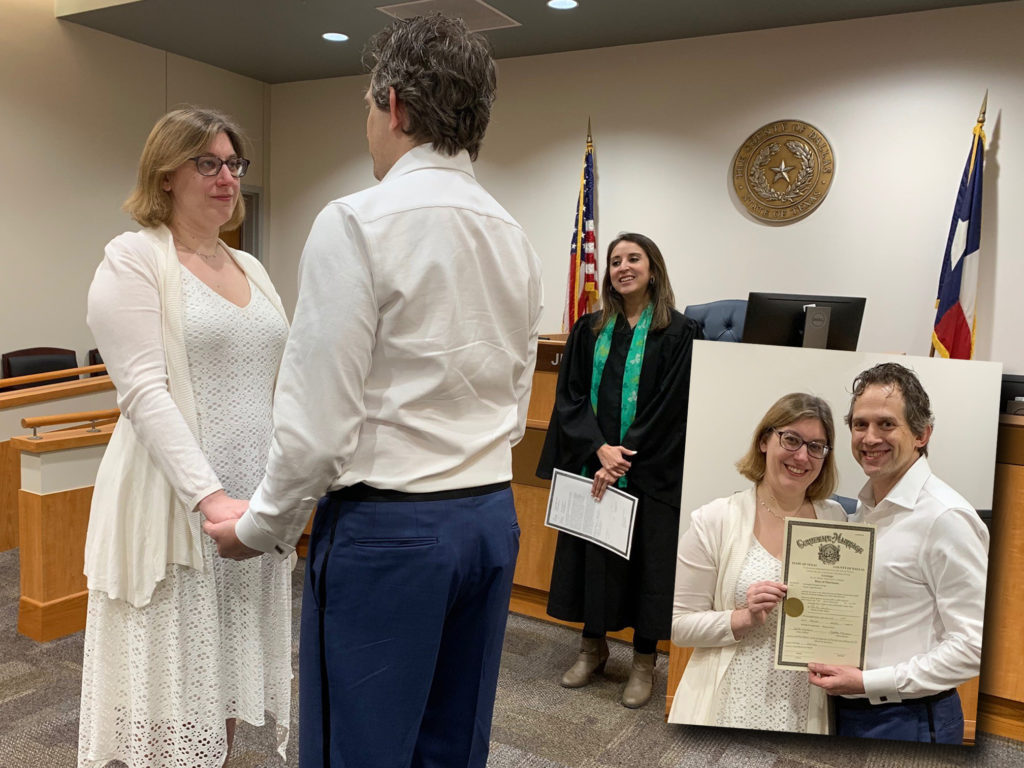
Nicole Williams and Butters
Three hundred ninety-two days ago, Nicole Williams, Jennifer Ecklund and Elizabeth Myers announced they had left the litigation practice at Thompson & Knight to open a Dallas office for St. Louis’ largest law firm, Thompson Coburn. They were joined by Hedrick Kring partner Katharine Battaia Clark.
The date was March 2. The firm and the lawyers had big plans – meetings and lunches with potential clients, wining and dining possible laterals to hire, travels to meet their new partners in Thompson Coburn’s five other offices and a big office opening party.
Less than two weeks later, a once-a-century global pandemic hit. Courthouses were shutdown. Restaurants and bars shuttered. Air travel nearly ceased. No lunches or dinners or receptions.
Literally days after opening its office, Williams, the firm’s Dallas managing partner, was in that office packing up documents, computers and supplies to take home.
“It was like setting up an Office Max in our garage,” she told The Texas Lawbook. “After that, either I made deliveries or our Dallas attorneys and staff picked up supplies or computer gear from my front porch in Northwest Dallas.”
Even large legacy law firms faced uncertainty in those early days of the pandemic, but being new lawyers at a new firm in a new state brings additional challenges.
Despite the monumental hurdles, Thompson Coburn doubled its headcount by adding four more litigators on May 3.
The firm now has seven partners, two counsel, two associates, a paralegal and a support staff of two. The strategic plan is to more than double its number of lawyers by this time next year, including adding attorneys that focus on corporate transactions, finance and real estate.
In the following Q&A, Williams, whose practice focuses on antitrust, advertising and RICO matters, discusses the firm’s first year.
Texas Lawbook: What date did the firm officially open in Dallas and how many lawyers joined you at the start?
Nicole Williams: Our official start date was March 2, 2020. We opened the office with me, litigation partners Jenny Ecklund and Elizabeth Myers, and bankruptcy partner Katie Clark. We had visited Thompson Coburn’s St. Louis office in early February for a photo and video shoot ahead of the office opening. We had plans that summer for a proper office opening party with clients, friends, and the new attorneys slated to join us. The best-laid plans…
Lawbook: What day did you realize Covid was going to impact the firm and what action did you take?
Williams: To be honest, when COVID first hit, I was more affected by its immediate impact on my personal life, not professional life. My wedding to my fiancé Chris George, a trainer for Abbott Diagnostics, was scheduled for March 29. The first thing we learned was that a friend who was going to lead the ceremony couldn’t fly into Dallas because of COVID restrictions. Elizabeth Myers in our office is ordained and offered to marry us, but then the small ceremony we had booked at the Dallas Arboretum had to be canceled anyway.
On March 17, I learned the Dallas courts were likely closing. So, I left work early, ran to Stein Mart to get some type of white dress, and met Chris at the Grand Prairie Municipal Court so our friend Judge Sasha Moreno could marry us in one of her last justice of the peace wedding ceremonies before lockdown. Her clerk kindly filmed our ceremony and took our wedding photos.

Nicole married Chris George on March 17, 2020 at the Grand Prairie Municipal Court before her friend Judge Sasha Moreno
On March 29, on what was supposed to be our wedding day, we had our wedding cake from Lakeview Bakery in Rowlett delivered to our house, dressed up in our wedding clothes, and danced in our house. It was disappointing to not be able to celebrate in person with our friends and family, but we’re happy we didn’t wait. And the whole thing was special in its own way.
Lawbook: How did the pandemic and office closings impact your launch plans?
Williams: We started Thompson Coburn’s Dallas office with temporary office space at Spaces McKinney Avenue in Uptown. When the shutdown first happened, I went to the office space and gathered up all our books, office supplies, and computer equipment, and brought them home. It was like setting up an Office Max in our garage! After that, either I made deliveries, or our Dallas attorneys and staff picked up supplies or computer gear from my front porch in Northwest Dallas.
Lawbook: What were your thoughts going into the pandemic in late March and early April on how it would impact (1) the practice and business of lawyers in Texas and (2) your firm’s Texas operations?
Williams: As litigators, we were worried about how long the courts were going to be closed. But by late April and early May, Dallas state and federal courts had really jumped on getting Zoom and other remote capabilities set up for all courtrooms, and hearings started back up. Because they were so proactive, our cases moved along and, for the most part, we didn’t see the extended court delays experienced in other parts of the country.
Lawbook: Did the pandemic impact your lateral recruiting efforts?
Williams: Yes, especially in the first weeks and months of the pandemic. All of us were dealing with so much uncertainty in our lives, our families, the economy, and everything else. It made it a bit harder to sell someone on why they should make a change and come join us.
But I definitely had help from Thompson Coburn in the firm’s swift and thoughtful move to a remote working environment. Their IT capabilities were excellent, communication lines stayed open, and we felt connected and supported every step of the way. In July 2020, I was named to the firm’s Management Committee, and after that, I could report directly to our existing attorneys and candidates about the constant discussions management was having on how to provide seamless service to our clients and support our people across the country.
Another point I emphasize with candidates, which has nothing to do with the pandemic, is the Firm’s commitment to diversity. It’s a real and tangible differentiator for us in the Dallas market. Every attorney in our Dallas office embodies gender, racial or LGBTQ+ diversity. I like working on diverse teams because I find them to be more efficient and creative, and clients also are interested in diverse legal teams in a real way. You can feel the difference in your working environment when you’re part of a place that values diversity. All of us have experienced some point in our careers when we’ve felt marginalized or ignored or underestimated. And because of that, we’re more aware of it and try to make sure it doesn’t happen to people on our teams.
Lawbook: What have been the first year’s biggest challenges?
Williams: The pandemic definitely hindered the normal activities and travel you would do when opening an office in a new market: having lunches with clients and prospective clients, attending conferences and networking events, and traveling to the other five Thompson Coburn offices to meet our new colleagues in person. I had a ton of meetings and travel that just got canceled immediately. Fortunately, we’ve moved a lot of those meetings to a virtual space. The Dallas office has held virtual happy hours with other Thompson Coburn offices. We held two really well-received virtual wine tastings for clients and friends before the holidays, and we have virtual trivia nights coming up next month. All of that helps us feel connected and supported.
Another challenge was the search for our permanent office space in Dallas. We took virtual tours of several potential spaces, and I made masked, socially distanced in-person visits to our top locations. In November 2020, we signed a lease with 2100 Ross Avenue. We have temporary office space there while an office remodel is ongoing. When it’s finished this year, we will have space for up to 40 attorneys.
Lawbook: What are two or three practice successes for clients have you and the firm scored during the first year?
Williams: With our colleagues in Thompson Coburn’s St. Louis office, we worked on a successful cross-office pitch to a major Dallas company to handle a federal putative class action in Missouri. We also collaborated with our Los Angeles colleagues on a successful pitch to defend a Texas food manufacturer in a federal putative class action in California. The judge in that matter recently granted our motion to dismiss the case. We also participated in the ongoing dispute over mandatory Texas Bar dues by filing an amicus in the Fifth Circuit on behalf of Concerned Lawyers of Color. Jasmine Wynton and Mackenzie Salenger in our office handled that brief.
Lawbook: As someone who specializes in clients targeted by federal agencies, how do you think the Biden Administration regulators/prosecutors will differ from the Trump folks when it comes to impacting your clients?
Williams: I think we’re going to see an increase in both antitrust and consumer protection-related prosecutions and investigations, but we don’t know yet where their focus may be.
Lawbook: Where do you want the firm’s DFW office to be one year from now?
Williams: We’d like to be up to 25 to 30 attorneys, including some Dallas-based additions to Thompson Coburn’s corporate, finance, and real estate groups.
